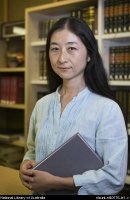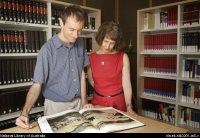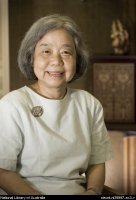2010
Associate Professor Masako Gavin, Japanese Studies, Bond University
The Life and thoughts of Ienaga Toyokichi: Bridging over the Pacific
"Excellent indexes and databases, as well as a superb collection of books and journals on Japanese history and International Relations enabled me to go into ‘lock down’ mode and concentrate on my mission – ‘impossible’ at home."

Ms Akiko Tomatsuri, PhD candidate, Classics, University of Sydney
A study of Western influence on Japan: the reception of ancient Greek drama in post-war Japan
"The NLA’s collection of scholarly studies on literature, theatre, and music related to Western influences on modern Japan, allowed me to pursue my research more broadly than at first conceived looking, and encouraged further exploration of the cultural, historical, social, and political contexts of each production. These materials should also be of value to those working on interdisciplinary studies of literature, theatre, or music in the Meiji, Taisho, and early Showa eras."

Mr Erik Ropers, PhD candidate, School of Historical Studies, University of Melbourne
Contested histories and memories of wartime sexual slavery and forced labour
"The Library’s extensive collection of Japanese reference materials and electronic resources enabled me to fill in important statistical and biographical holes in my research. The collections also contained a number of specialist and low-circulation journals not indexed in the National Diet Library of Japan’s catalogue or the MagazinePlus database that proved to be invaluable for my research topic. Before visiting I was unaware of a few of these journals’ existence!"

Ms Amy Reigle (Ainsworth) Newland, Independent scholar, Adelaide
Toyohara Kunichika (1835-1900) – Artistic Innovator, Traditionalist, or Artist of his Times
"In thinking about my recent tenure at the NLA under the auspices of the Japan Study Grant, I am reminded of the oft-cited quote of the 18th-century English author Samuel Johnson, ‘The greatest part of a writer's time is spent in reading, in order to write; a man will turn over half a library to make one book."

Dr Thomas Wilkins and Dr Minako Ichikawa-Smart, Sydney
Securing Japan-Australia relations
2009
Dr Yasuko Claremont, Senior Lecturer, Department of Japanese Studies, University of Sydney
Literary connections between Australia and Japan
"In the library I found a comprehensive supply of books in English specificaly relating to my project, including translations into English of Japanese fiction, and I aslo found interconnected material giving me good background knowledge..."
"I was quite impressed by some of the latest collections of sociological materials, for example, seven volumes of short stories published in occupied Japan (1945-1952) by Fujiwara Shoten. I came across them while browsing in the stack."

Dr David Chapman, Program Director, International Studies and Senior Lecturer, University of South Australia
Koseki: the ‘State’ of creating and controlling Japanese citizens
"The scheme is highly commendable and extremely effective in achieving its goals.The ability to access resources twenty-four hours a day aslo maximised the efficiency of the time I spent in Canberra. .. The library staff in the Asian materials collection are extremely professional, helpful and knowledgeable. I also benefited from the expertise and assistance of the staff in the general section of the library."

Associate Professor Sandra Wilson, School of Social Sciences and Humanities, Murdoch University
Japanese nationalism in the early Meiji period
"As a researcher from Western Australia, I found this grant more useful than I can say. .. In providing japan Study Grants, the National Library of Australia is extending extremely valuable suport to Japan Studies in Australia, of a kind that cannot be replicated by any other institution, because no other institution comes remotely close to the physical and human resources that the National Libray posesses."

Ms Caroline Norma, PhD candidate, Asia Institute, University of Melbourne
Hostess’ entertaining during the US occupation of Japan
"The Library's collection of materials on comfort women is particularly far-reaching, and includes journals, which is where the latest historical and theoretical work on the subject is usually first published in Japanese. The library also holds non-scholarly sources on Japan's sex industry. The Japanese tabloid journals / magazines that the library holds were also useful for me. ...
Access to the closed stack was an invaluable priviledge that led me to come across many books that I wouldn't have found via the catalogue."

2008
Mr Mark Pendleton, PhD candidate, University of Melbourne
Remembering the 1995 Tokyo subway gassing: memories and representations of the incident.
"One of the key benefits of this grant has been the ability to immediately access magazine and journal articles from the stack. It was invaluable to have complete, or nearly complete, collections of major monthly and several weekly publications at hand.
"I stumbled across a couple of publications that do not appear on the major magazine/journal database Magazine Plus while browsing the stack shelves, such as Japan Military Review. Being able to extract information from these surprise finds, was a welcome result of having direct access to the stacks."

Associate Professor Leon Wolff, Faculty of Law, University of New South Wales
The death of lifelong employment in Japan? A legal analysis
"The literature I accessed was in the field of law, but given the interdisciplinary connotations of my project, I also made wider use of materials in economics, sociology and gender studies. In addition to the secondary literature, I also made wide use of primary source materials, such as Japanese statutes, cases and official statistics.
"The opportunity to work in the Asian Reading Room and use the Asian Collection was a prized one. This is for three reasons. First, the National Library boasts excellent indexes and databases. In my first two weeks, I felt I was permanently camped in front of the Japanese-language computer using the Nichigai MagazinePLUS database, an excellent index of academic journals and reviews in the area of the social sciences. Second, the Asian Collection has a superb collection of books and journals in Japanese law. Indeed, I can say with some confidence that it boasts most of the resources (around 70-80%) of those materials that you would expect in a high quality law library in Japan. This makes it one of the world’s best libraries (outside of Japan) for researching Japanese law. And given the strategic importance of Japan to Australia both economically and geopolitically, this is a singular achievement."

Ms Victoria Eaves, PhD candidate, Department of Japanese, University of Tasmania
Deconstructing myths: The Influence of the Kokutai discourse on Japanese soldier war diaries in New Guinea WWII
"The value associated with being able to personally browse the stacks can not be understated. The new catalogue system has enhanced the ability to find material, but nothing can be as useful as actually looking through the surrounding areas. I have located an enormous amount of additional material through this process.
The duration of stay for my fellowship was very satisfactory, particularly as I was afforded the opportunity to stay after hours and on weekends."

Ms Jennifer Harris, PhD candidate, University of Adelaide
The formation of Japanese art collections in Australian public museums, 1879-1945
"I arrived with a ‘wish list’ of texts and the intention to target the following four collection areas: the Japanese collection, the Harold S Williams collection, the D.S. Sissons manuscript collection and the Petherick rare books collection.
"I wish to thank the National Library for this generous opportunity for such open access to materials both across collections but equally importantly unfettered by normal library hours. It enables those study grant recipients who have the complexity of family, study and work commitments to go into ‘lock down’ mode in a way not possible in the usual home study environment."

Dr Kate Barclay, Senior lecturer, Japan Studies, Institute for International Studies, University of Technology Sydney
Japanese governance of fisheries
"My initial aim in applying for a Japan Studies Grant was to look at Japanese fisheries governance, focussing particularly on aspects of fisheries connected to relations with neighbouring countries. I found quite a lot of this kind of material in a range of Japanese fisheries histories in the NLA collection. .... This material will feed into an ongoing project I have on a history of international relations between northeast Asian countries through fisheries interactions. ... Because a month is a short period and because I found a great deal of other material also in the collection, I did not read these histories in depth during the month, rather I made copies of pertinent parts of books and noted the names of others I might want to borrow through inter-library loans later."
